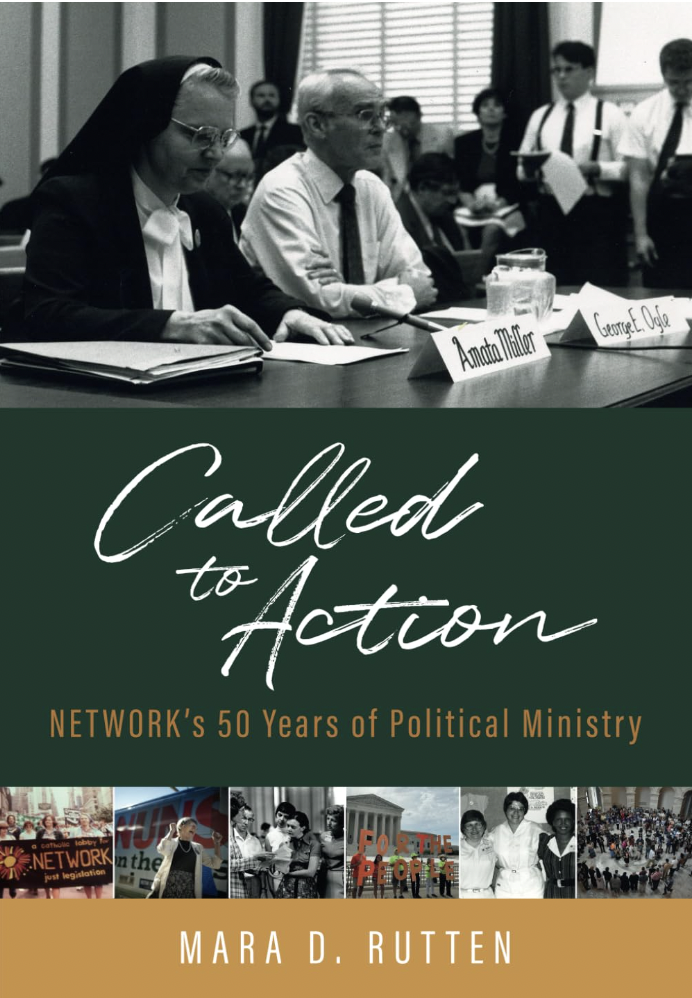By Heather Scott-Molleda, Senior Director, Communications
Helping the ignored or forgotten has always been at the heart of the work of the Sisters of Mercy and other Catholic sisters. Walking with the poor, the sick, the women and children, the migrants, in essence, is a fight for justice. That same fire for justice has fueled sisters in the NETWORK lobby, including many Sisters of Mercy, in their struggle for change over the past 50 years.
In her newly published book, Sister Mara Rutten highlights the efforts of the organization that were purposely concentrated on “bottom drawer” issues not addressed by other groups.
Called to Action: NETWORK’s 50 years of Political Ministry, recounts the work that began with the aim of changing the policies that impact the problems at their source, problems front-line ministries struggled to address, including poverty and housing.

The group was launched at an inaugural meeting in Washington, D.C. in 1971. The founding group of 47 sisters came from many orders, including two Sisters of Mercy. The mission and ministry was to serve as a political lobby working in the halls of government, confronting lawmakers and officials, while raising awareness of the plight and rights of the marginalized in society.
Sisters of Mercy have been involved in the ministry since the beginning, including two sisters from Rhode Island, Elizabeth Morancy and Mary Reilly, who after the inaugural meeting took on a side-hustle at a local department store during Christmas to raise the $50 each sister had pledged to get the organization off the ground; Sister Kathy Thornton, who was one of NETWORK’s first directors; and Sister Linda Werthman, who was one on the Nuns on the Bus in the organization’s most visible campaign.
The book also looks at the famous comments made by Sister Theresa Kane, then-president of the Leadership Conference of Women Religious (LCWR), during an audience with Pope John Paul II in Washington, D.C., calling for the church to be open to the voices of women and provide for them to serve in all ministries.
In the last decade or so, NETWORK leapt into the limelight with the Nuns on the Bus campaigns, as well as interviews with famous Catholic personality Stephen Colbert. That has given them something of a reputation as rabble-rousers, but as Mara makes clear in her history, their work is a direct response to a Vatican II mandate to live out the Gospels and take an active role in working for social justice. Unfortunately, she says, many people don’t know about that or hear about it much anymore in a political climate that drives the narrative that U.S. Catholics should be single-issue voters.
“They’re still fighting the good fight. And they’re still talking about Catholic social teaching,” Mara said in a recent interview.
NETWORK leaders would refer regularly to those “foundational” directives, “Action on behalf of justice … (is) a constitutive dimension of the preaching of the gospel.”
“They would rattle that off, word for word, like it was their Social Security number,” said Mara, a historian who for a time served as a NETWORK lobbyist. She was recently received as a novice.
Unfortunately, many issues the sisters have worked on have not been solved.
“One of the depressing parts of this work is what we were working on 50 years ago, we’re working today,” she said. “Housing hasn’t been solved. Hunger hasn’t been solved … And right now, everything is so divisive and chaotic.”
Though sisters and their leadership have on occasion been “called on the carpet” for taking Vatican II seriously, Mara stresses that those mandates “have not been rescinded,” even though the sisters can seem like outliers now.
And while a single issue dominates political discourse among many U.S. Catholics, NETWORK has highlighted the message of Pope Francis’ March 2018 exhortation Gaudete et Exsultate (Rejoice and be glad) which reminds everyone that other issues are “equally sacred:”
“Equally sacred, however, are the lives of the poor, those already born, the destitute, the abandoned and the underprivileged, the vulnerable infirm and elderly exposed to covert euthanasia, the victims of human trafficking, new forms of slavery, and every form of rejection.”